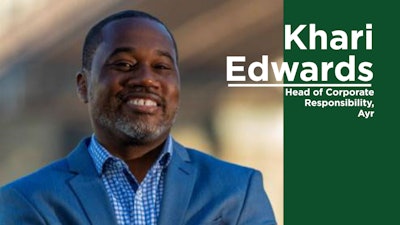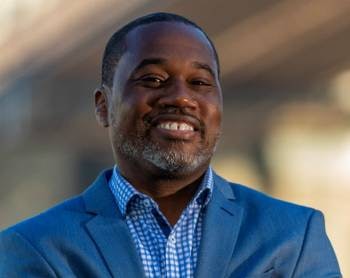

With New York and New Jersey making grand entrances in the adult-use cannabis space this year, the team at multistate operator Ayr Wellness wanted to help prepare an equitable workforce for the jobs to come. In March, Khari Edwards, the company’s head of corporate responsibility, led a series of “Changing Legacies” events: expungement clinics for those with cannabis-related convictions lingering on their records.
The intent at events like those, he says, is to get out in front of this persistent problem, to confront the weight of past punishment keeping people separated from a sense of freedom.
“The reason why we named them ‘Changing Legacies’ is because, if you expunge somebody’s record, you now create an opportunity for these folks to grow,” Edwards says. “You put them in a bigger pot of opportunity.” This is an inherent promise of the emerging cannabis industry, he adds, unique in its attachment to social justice.
He describes one man he met at a Changing Legacies clinic, a man who had been convicted of a cannabis-related crime in 1973. For nearly 50 years now, that albatross had dogged him through jobs and housing and family relationships, tamping down his ability to move freely. The sheer scope of time was jarring to Edwards. The expungement process—which itself tends to be rather opaque from one jurisdiction to another—helped lift that burden from his shoulders, Edwards says.
While public agencies and legislators are increasingly adding various strands of social equity language into the laws governing state-legal cannabis markets, the work falls even more visibly to private businesses already operating in the space.
Past cannabis-related convictions can hold men and women back from participating in the cannabis market itself in many cases. Those who have entered the space through licensing—or simply through being hired—have an opportunity to provide a support system for those seeking to get in now.
This is where the phrase “corporate responsibility,” the whole of Edwards’ job title, comes in.
Edwards has seen this dynamic of workforce opportunities play out in Brooklyn, where he grew up, for most of his life. His political career started in 1997, where different jobs brought him across the borough, face to face with families and public agencies, “dealing with disparities, dealing with social justice, dealing with economic health justice.”
For much of the past decade, he worked as vice president of external affairs for Brookdale University Medical Hospital Center, which, as Edwards points out, sits in the middle of an area tagged with a $26,000 median income and a third-grade reading level across the local population. The experience he picked up there led him to run for borough president in 2021.
He didn’t win, but his grassroots campaign caught the attention of Ayr CEO John Sandelman, who offered him a job.
“He was just like, ‘Would you want to work for a cannabis company?’ And I was like, ‘Doing what? You know, this is not the world that I'm in.’ And he said, ‘You'd be surprised. Cannabis really falls into the line of all the things that you've been doing, all the things that you've been talking about, from social equity to social justice education.”
Edwards took him up on the offer and has since found a role in a multistate operation that can touch people’s lives—even outside the cannabis workforce, even outside New York City.
“Like, imagine what you could do on a global level for folks,” he remembers hearing from the Ayr team. “And that's what made me sign up. I realized outside of just New York, there are so many inequities that go on throughout the country, and we really stand on a different once-in-a-lifetime opportunity to level that playing field.”
The “Changing Legacies” expungement clinic series bought Edwards to New York, New Jersey, Massachusetts, Illinois and Nevada, and each session taught him a bit more about this industry that has accepted him. And while Ayr does not yet have a license to operate in New York’s marketplace, he’s hoping to his home state’s cannabis market flourish—with social equity provisions front and center. The key, he says, is to act globally, but then to bring the work down to a local level.
Already, the state is off to a productive start: New York’s first adult-use dispensary licenses will be issued to applicants with cannabis-related convictions.
But public agencies can only go so far on prescribing an equitable stance on cannabis, Edwards says. It’s up to businesses to enact those policies and lift up others with the resources available—especially in communities that bore the brunt of oppressive criminal laws for so many years.
“How do we now create a standpoint that [cannabis is] inclusive of these communities and that we start to break this continued cycle of poverty and this continuous cycle of suffering?” Edwards asks. “That’s my pathway for the summer, obviously adding in expungement events that we're doing, because, again, we keep chipping away. We're going to end up with 2,000, 3,000, 4,000 people expunged and excited for their next steps.”























